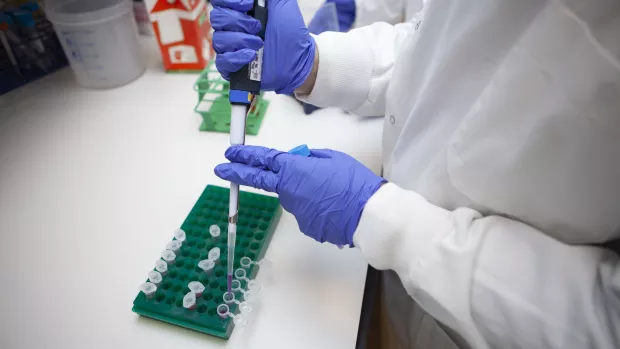
The research triple whammy that will stop MS
We now know enough about what goes wrong in MS to know what needs to be done to fix it.
Scientists are working on three ways to tackle MS: stopping the immune damage, promoting myelin repair and protecting nerves from damage.
We're not there yet, but we believe that if we achieve these goals then we can stop MS.
What goes wrong in MS?
In MS, immune cells attack the protective myelin coating around our nerve cells. Myelin plays a vital role in how nerves work and also protects them from damage.
When myelin becomes damaged, messages find it harder to get through – or can’t get through at all. That’s what causes the symptoms of MS.
Step 1: stop the damage in its tracks
To stop MS early we need to prevent our immune system damaging myelin.
There has been incredible progress in this area of research, and we now have 12 available disease modifying therapies (DMTs) for relapsing MS that help do this.
Researchers are also testing the benefits of stem cell transplantation (HSCT), which aims to stop the immune system attacking myelin.
We’re starting to see progress in immune system research for progressive MS as well. Last year a treatment called ocrelizumab was shown to slow progression in primary progressive MS. And the latest results for the drug siponimod look promising for secondary progressive MS too. But these drugs can't help if permanent damage has already been done.
Right now we’re funding nine projects that look at the role immune cells play in MS.
Step 2: repair myelin
Our bodies have an amazing capacity to repair myelin and get nerves working properly again. But this repair becomes less effective over time and doesn’t work as well as it should in MS.
Researchers are finding new ways to put myelin back on nerves. We’re funding 12 myelin repair projects, including our world-class research centres in Cambridge and Edinburgh.
Every discovery brings new opportunities for us to develop myelin repair treatments – and these could be effective for everyone with MS.
> Discover the latest myelin repair research
Step 3: protect nerves from damage
We need to make sure that our nerves are happy, healthy and protected from damage. And this is even more important when myelin isn’t around.
Researchers are using their knowledge of nerves to design new ways to keep them alive and healthy. They’re aiming to find treatments that can prevent nerve loss, which could slow or stop the progression of MS.
We’re funding seven projects to help us on our way to having neuroprotective treatments for MS.
We’re excited because clinical trials of potential treatments for people with progressive MS are already underway. This includes our MS-SMART trial, as well as drugs like simvastatin.




